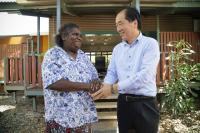Jabiru [AAP]
It seemed an unlikely pairing: a meeting between the Japanese prime minister who oversaw the response to the Fukushima nuclear disaster and traditional Aboriginal owners of the land at Kakadu that supplied the uranium to Japan’s reactors.
Naoto Kan was prime minister of Japan during the Fukushima nuclear crisis that gripped the country following the earthquake and tsunami of March 11, 2011.
On Saturday he travelled to Jabiru in Kakadu National Park, about 260km east of Darwin, to share his experiences with the Mirarr traditional owners of the land partly occupied by the Ranger uranium mine.
He will travel to Perth, Canberra and Brisbane in coming days to highlight concerns about the uranium trade.
‘The nuclear crisis at Fukushima was fuelled by uranium that came from this area; it confirmed the worst fears Aboriginal people had from as early as 1976, that one day there would be a problem, either here or overseas, from the mining in this place,’ said Justin O’Brien, CEO of the Gundjeihmi Aboriginal Corporation that represents the Mirarr traditional owners.
‘It’s important for the former prime minister to see the front-end impacts of the nuclear fuel cycle, how devastating they’ve been for this community.’
Mr Kan said it was disappointing that Australia’s investments in renewable energies seem to be going backwards, as the government prepares to export uranium to India.
‘The reality of what really happened at the Fukushima disaster led me to change my opinion to now believe that we need to move away from nuclear power,’ he told reporters in Jabiru on Saturday.
In the first 100 hours after the earthquake and tsunami, there were three meltdowns, three melt-throughs and hydrogen explosions in three of the nuclear reactors at the Fukushima-Daiichi Power Plant, Mr Kan said.
‘If it continued, a 250km radius around the plant would have had to be evacuated; this would have affected one-third of the entire area of Japan, including Tokyo, or 50 million people,’ he said.
‘As far as I can imagine the only other thing that could cause such huge damage would be a very great scale war. I felt the only choice possible was to move away from nuclear energy.’
He said Japan is currently exporting nuclear power plants to Turkey and Vietnam and is in talks to do so with India, and said that when in power he too supported such a policy, but has come to regret it.
‘I believe the potential of renewable energy here in Australia is many times that of Japan, so I would like to encourage Australia to take advantage of this potential,’ he said.
Mirarr traditional owner Annie Ngalmirama told AAP she was upset that uranium from Kakadu had been involved in the Fukushima disaster.
‘It’s really sad, what happened to his country,’ she said.
‘They can’t grow anything on that country, people getting sick… It’s really bad what they’ve done.’
Ranger Uranium Mine is due to wrap up operations by 2021, followed by five years of rehabilitation so the site can be reintegrated into the surrounding national park.
Exploration is currently underway at Ranger Three Deeps, with a progress report due at the end of September.
The Mirarr have not yet decided whether they will support it.

